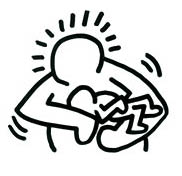Feeding your baby

HIV can be transmitted to the baby from breast milk.
This is why mothers with HIV in the UK are usually advised to use bottles and infant formula milk.
This advice is different in other parts of the world, particularly where there is no regular access to clean water, sterilising equipment and formula milk.
Choosing to breast/chest feed in the UK
In the UK (and other high-income countries), feeding with formula milk is the safest way to avoid HIV transmission after birth.
BHIVA continues to recommend that babies are fed exclusively with formula milk.
However, since 2010 BHIVA has also stated that women who are undetectable on ART with good adherence during pregnancy and who choose to breast/chest feed should be supported to do so, if they:
- Have been on ART for at least 10 weeks AND
- Have two HIV viral loads tests less than 50 during pregnancy at least 4 weeks apart AND
- Have an HIV viral load less than 50 at more than 36 weeks of pregnancy.
Breast/chest feeding should be for a maximum of 6 months. This is because the risk increases over time (even on ART).
The estimated risk of transmission of HIV through breastfeeding on effective ART is extremely low (3 out of 1000 infants at 6 months and 7 out of 1000 infants at 12 months) – but it is not zero.
It is very important for both mother and infant to have monthly monitoring during breastfeeding and for two months after.
BHIVA have produced a position statement on infant feeding and HIV:
Interim BHIVA position statement on HIV and mixed infant feeding
The BHIVA/CHIVA position statement on infant feeding in the UK can be accessed here:
bhiva.org/BHIVA-CHIVA- PositionStatement.aspx
Many community groups in the UK (including i-Base, Positively UK and the UKCAB) also do not recommend breastfeeding for HIV positive mothers.
Further reading:
positivelyuk.org/pregnancy
Choosing to breastfeed in the UK
Although BHIVA guidelines continue to strongly recommend formula feeding to prevent vertical transmission they recognise that a few women might still prefer to breastfeed their babies.
The guidelines recommend that these women should be advised of the on- going risk of HIV transmission.
But they should be supported in their decision if they have an undetectable viral load on ART and good adherence.
If a woman decides to breastfeed,she and her baby should be reviewed monthly in clinic for viral load testing during and for 2 months after stopping breastfeeding.
Last updated: 1 November 2023.
